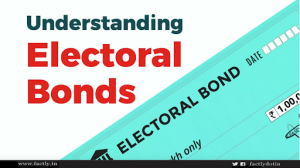29 Jan Let’s understand the Transparency issue in Electoral Bonds
Let’s understand the Transparency issue in Electoral Bonds- Today Current Affairs
The essence of democracy lies in the transparent working of the democratic government, as for democracy we say “it is of the people, by the people and for the people.

Recently the union government, prior to the election in five states, authorized the State Bank of India to issue and encash a new tranche of electoral bonds.
Let’s look into the process of electoral bonds : The Hindu Analysis
SBI on getting the notification from the central government starts issuing electoral bonds in denominations ranging from Rs1000 to Rs1 crore. These electoral bonds are bought by donors, mostly the companies. In this transaction the donor gets the bond and SBI gets the money. This bond then will be given to a political party. The political party to which the electoral bond is given, will submit it to SBI and will get the money from SBI, said as that electoral bond has been encashed now.
It is interesting to note that these electoral bonds are bearer bonds, meaning it will not carry the name of the buyer/ Donor. But this can be purchased only through a bank account (not by cash). The political parties will also be given money in their bank account.
It is little different from the practice where donors used to give money directly to the political parties. In this case donations have been made through the SBI/ Banking system. Still the donations through electoral bonds are considered anonymous, because it will never be known to anyone that which donor has donated money to which political party.
Now the bigger question arises that how the people of the country will get to know which political party has got how much donations, as the donor as well as the political party are not obligated to disclose their donations.
Still there is one way to get this information. In essence it is like “match the following” as was suggested by late Union finance minister Arun Jaitley and recently said by the Supreme Court in an order while denying interim stay on the operation of electoral bonds.
The companies file these records of donations in their Corporate financial statements to the Registrar of the companies.
On the other hand the political parties in India are required to file a return with the Election Commission of India in which they mention how much money they got in donations.
Any voter interested in finding out the identity of Political donors, can look into the records of return filed by political parties to Election Commission of India and records of corporate financial statements filed by companies to companies of Registrar.
Now the very first thing is that The voters are not resources enough to get these records. and even if we assume that they a got these records, there is no attendant obligation on political parties to provide details to Election Commission of India/ Public on each donation received by them electoral bonds, as well as the companies are also under no obligation to disclose the name of the party to the home they made the donation. Thus it can never be that which Donor gave to which political party. The Hindu Analysis.
The Supreme Court of India has paid scant attention to the issue and has allowed the scheme to continue unabated. According to the court, since both the purchase and encashment of bonds are made through the banking system, all it would take for a person to glean the identity of a donor was for her to look through every corporation’s financial system.
The debate arises here if it is really encroaching on “the right to know” under the right to freedom of expression which is guaranteed by the constitution.
Another concern came in picture with the amendments made in the electoral bonds which has done away with restrictions that were in place before the introduction of the scheme. Amendments have been made removing a previous prohibition that disallowed a company from donating anything more than 7.5 % of its net profits over the course of preceding three years. Similarly a mandate that allowed only three years old companies to make donations (so as to discourage people from using Shell Corporation to funnel money into politics) was also listed.
The government is of the view that first voters have no fundamental right to know how political parties are funded and second it helps eliminate the role of Black Money In funding elections. But in democracy a voter must know the identity of the backing of the political parties to choose one vote carefully. The supreme court also consistently held that voters have a right to freely express themselves during an election and that they are entitled to all pieces of information that give purpose and vigour to this right. The Reserve Bank of India also, reportedly advised the government against the skills introduction.
The worries over the electoral Bond are about its anonymity which befouls the basis of our democracy and prevents our election from being truly free and fair.
In this article we mention all information about Let’s understand the Transparency issue in Electoral Bonds- Today Current Affairs.
Md Layeeque Azam, Economics Faculty




No Comments